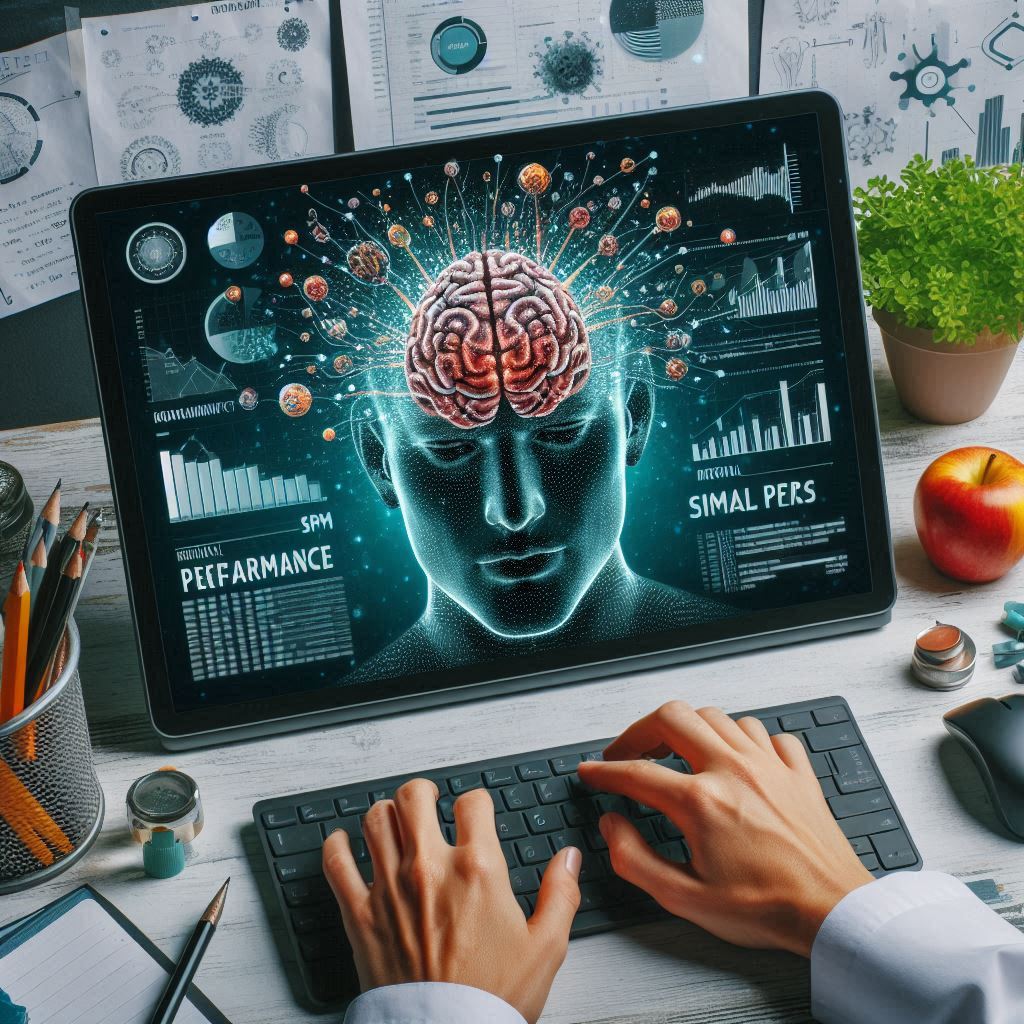Biohacking for Mental Performance: Small Changes, Big Impact
Imagine if you could boost your brainpower with just a few simple lifestyle changes. That’s the promise of biohacking—an approach that focuses on small, targeted adjustments to optimize your mental performance. Whether you’re looking to enhance your focus, improve your memory, or increase your productivity, biohacking offers practical solutions to help you achieve your cognitive goals. But what exactly is biohacking, and how can it make such a big difference in your mental acuity?
What is Biohacking?
Biohacking is the practice of making small, incremental changes to your diet, sleep patterns, exercise routines, and overall lifestyle to improve your body and mind’s performance. Think of it as DIY biology—you’re experimenting with different techniques to find what works best for you. And when it comes to mental performance, biohacking can be a game-changer.

The Importance of Mental Performance
Mental performance isn’t just about having a sharp memory or quick thinking. It’s about how effectively you can manage stress, stay focused, solve problems, and maintain mental clarity throughout the day. By optimizing these aspects, you can not only perform better at work but also enjoy a higher quality of life.
The Science Behind Biohacking
Understanding Neuroplasticity and Cognitive Function
Our brains are incredibly adaptable, thanks to neuroplasticity—the ability of the brain to reorganize itself by forming new neural connections. This adaptability is what allows us to learn new things, recover from injuries, and adapt to new situations. Biohacking taps into this natural ability, encouraging the brain to function at its best through targeted lifestyle changes.
How Small Lifestyle Changes Affect Brain Health
The Role of Nutrition in Cognitive Function
What you eat directly impacts how well your brain functions. Nutrient-dense foods, such as leafy greens, fatty fish, and nuts, provide the essential vitamins and minerals your brain needs to stay sharp. Omega-3 fatty acids, for example, are crucial for maintaining brain health and improving cognitive function.
The Impact of Sleep on Mental Performance
Sleep is another critical factor in mental performance. During sleep, your brain consolidates memories, repairs itself, and clears out toxins that accumulate during the day. By optimizing your sleep patterns, you can enhance your memory, improve your focus, and boost your overall cognitive function.
Key Areas of Biohacking for Mental Performance
Optimizing Your Diet for Brain Health
Nutrient-Dense Foods for Cognitive Enhancement
A diet rich in fruits, vegetables, whole grains, and lean proteins provides the building blocks your brain needs to function at its best. Foods like blueberries, turmeric, and dark chocolate are particularly beneficial for cognitive health, thanks to their high levels of antioxidants and anti-inflammatory properties.
The Role of Supplements in Mental Acuity
In addition to a healthy diet, certain supplements can enhance mental performance. Nootropics, often referred to as “smart drugs,” are supplements that can improve cognitive function, memory, creativity, and motivation. Common nootropics include caffeine, L-theanine, and omega-3 supplements.
Sleep Optimization Techniques
Understanding Sleep Cycles and Their Importance
Sleep is not just about quantity; quality matters too. Understanding your sleep cycles—light sleep, deep sleep, and REM sleep—can help you optimize your rest. Deep sleep is crucial for physical recovery, while REM sleep is vital for cognitive functions like memory and learning.
Practical Tips for Better Sleep
To optimize your sleep, establish a consistent bedtime routine, limit exposure to screens before bed, and create a sleep-conducive environment. Keeping your bedroom cool, dark, and quiet can significantly improve your sleep quality.
Physical Activity and Its Cognitive Benefits
Exercise Routines That Boost Brain Function
Regular physical activity is one of the most effective ways to improve mental performance. Exercise increases blood flow to the brain, promotes the growth of new neurons, and releases endorphins that enhance mood and cognitive function.
The Connection Between Movement and Mental Clarity
Exercise doesn’t just make your body stronger—it also sharpens your mind. Activities like aerobic exercise, strength training, and yoga have been shown to improve memory, attention, and problem-solving skills.
Stress Management and Mental Performance
Techniques for Reducing Stress
Stress is a major obstacle to mental performance. Chronic stress can impair memory, reduce focus, and lead to burnout. Biohacking stress involves techniques like deep breathing, progressive muscle relaxation, and spending time in nature to lower cortisol levels and improve mental clarity.
The Role of Mindfulness and Meditation
Mindfulness and meditation are powerful tools for managing stress and enhancing mental performance. Regular meditation can rewire your brain for better focus, emotional regulation, and resilience in the face of challenges.

Advanced Biohacking Techniques
Nootropics and Cognitive Enhancement
Overview of Popular Nootropics
Nootropics, or cognitive enhancers, are a popular biohacking tool for boosting mental performance. Common nootropics include caffeine, which improves alertness, and L-theanine, which promotes relaxation without drowsiness. These substances can be powerful tools when used correctly.
How to Use Nootropics Safely
While nootropics can enhance mental performance, it’s essential to use them responsibly. Start with low doses, consult with a healthcare provider, and monitor how your body and mind respond to avoid potential side effects.
Technology and Biohacking
Brain-Training Apps and Devices
Technology has opened up new avenues for biohacking mental performance. Brain-training apps and devices can help improve memory, focus, and cognitive flexibility. Apps like Lumosity or devices like Muse provide targeted exercises to keep your brain sharp.
The Potential of Neurofeedback for Cognitive Improvement
Neurofeedback is a technique that uses real-time feedback from brain activity to teach self-regulation of brain function. This technology can help improve focus, reduce anxiety, and enhance overall cognitive performance.
Intermittent Fasting and Mental Clarity
How Fasting Affects the Brain
Intermittent fasting isn’t just a weight-loss tool—it can also boost brain function. Fasting triggers a process called autophagy, where the body clears out damaged cells, including in the brain. This process can enhance mental clarity and protect against neurodegenerative diseases.
Best Practices for Incorporating Fasting
To safely incorporate intermittent fasting, start with a 12-hour fasting window and gradually increase it as your body adapts. It’s essential to stay hydrated and listen to your body to ensure you’re getting the benefits without overdoing it.
Implementing Biohacking in Daily Life
Creating a Biohacking Routine
To make biohacking a sustainable part of your life, start small. Choose one or two areas to focus on, like diet and sleep, and gradually incorporate more techniques as you become comfortable. The key is consistency—small changes over time can lead to significant improvements.
Tracking Progress and Adjusting Strategies
Keep track of your progress by journaling or using apps that monitor sleep, diet, and mental performance. Regularly review your results and adjust your biohacking strategies to optimize outcomes.
Balancing Biohacking with Daily Responsibilities
Biohacking should enhance your life, not add stress. Find a balance that works for you, and don’t feel pressured to do everything at once. Prioritize the changes that have the most significant impact on your mental performance.
The Benefits of Biohacking for Mental Performance
Enhanced Focus and Concentration
Biohacking can lead to noticeable improvements in focus and concentration. By optimizing your brain health, you’ll find it easier to stay on task and complete work efficiently.
Improved Memory and Learning Abilities
With the right biohacking strategies, you can enhance your memory and learning abilities. Techniques like sleep optimization and nootropics can significantly improve your capacity to retain and recall information.
Increased Productivity and Efficiency
Ultimately, the goal of biohacking is to boost productivity and efficiency. By fine-tuning your mental performance, you’ll accomplish more in less time and with greater ease.
Potential Risks and Considerations
Understanding the Risks of Over-Biohacking
While biohacking offers many benefits, it’s essential to be aware of the risks. Overdoing it can lead to burnout, anxiety, or even physical harm. Listen to your body and mind, and don’t push beyond your limits.
The Importance of Individualized Approaches
Biohacking is not a one-size-fits-all solution. What works for one person may not work for another. Tailor your approach to your unique needs, and be open to adjusting your strategies as you learn what works best for you.
Consulting with Professionals Before Making Significant Changes
Before making significant changes to your diet, sleep, or supplement regimen, it’s wise to consult with a healthcare professional. They can provide guidance tailored to your health status and goals, ensuring you biohack safely and effectively.
Real-Life Success Stories
Individuals Who Transformed Their Lives with Biohacking
There are countless stories of individuals who have transformed their lives through biohacking. From entrepreneurs who optimized their mental performance to achieve business success to students who enhanced their cognitive abilities for academic excellence, these stories serve as inspiration for what’s possible.
How Small Changes Led to Major Improvements
Often, it’s the small changes that lead to the most significant improvements. Whether it’s adjusting your sleep routine, incorporating new supplements, or starting a meditation practice, these incremental adjustments can have a profound impact on your mental performance.
The Future of Biohacking for Mental Performance
Emerging Trends in Biohacking
The field of biohacking is continually evolving, with new trends emerging regularly. From personalized nutrition plans based on genetic testing to advanced brain-computer interfaces, the future of biohacking is exciting and full of potential.
The Role of AI and Machine Learning in Biohacking
AI and machine learning are set to revolutionize biohacking. These technologies can analyze vast amounts of data to provide personalized recommendations for optimizing mental performance, making biohacking more accessible and effective than ever before.
How Biohacking is Shaping the Future of Cognitive Health
As biohacking continues to grow in popularity, it’s poised to play a significant role in the future of cognitive health. By empowering individuals to take control of their mental performance, biohacking has the potential to improve quality of life on a global scale.
Conclusion
Biohacking for mental performance is about making small, targeted changes that can have a big impact on your brain’s function. Whether you’re optimizing your diet, improving your sleep, or incorporating advanced techniques like nootropics, biohacking offers practical solutions to enhance your mental acuity, productivity, and overall quality of life. The key is to start small, track your progress, and make adjustments as needed. With the right approach, biohacking can help you unlock your full cognitive potential.
FAQs
What are the most effective biohacks for beginners?
For beginners, focusing on optimizing diet and sleep patterns is a great start. Incorporating nutrient-dense foods, establishing a consistent sleep routine, and engaging in regular physical activity can significantly improve mental performance.
How long does it take to see results from biohacking?
Results can vary depending on the biohacks you implement and your consistency. Some people notice improvements in mental clarity and focus within a few weeks, while others may take a few months to experience significant changes.
Are there any side effects to biohacking?
While biohacking is generally safe, it’s essential to approach it responsibly. Over-biohacking or using nootropics without proper guidance can lead to side effects like anxiety, insomnia, or digestive issues. Always consult with a healthcare professional before making significant changes.
Can biohacking help with mental health conditions like anxiety and depression?
Biohacking can support mental health by optimizing factors like diet, sleep, and stress management. However, it should not replace professional treatment for conditions like anxiety or depression. Always seek advice from a mental health professional.
How do I know if a biohacking strategy is working for me?
Track your progress through journaling, apps, or regular self-assessments. If you notice improvements in focus, memory, and overall well-being, it’s a good sign that your biohacking strategies are effective.






